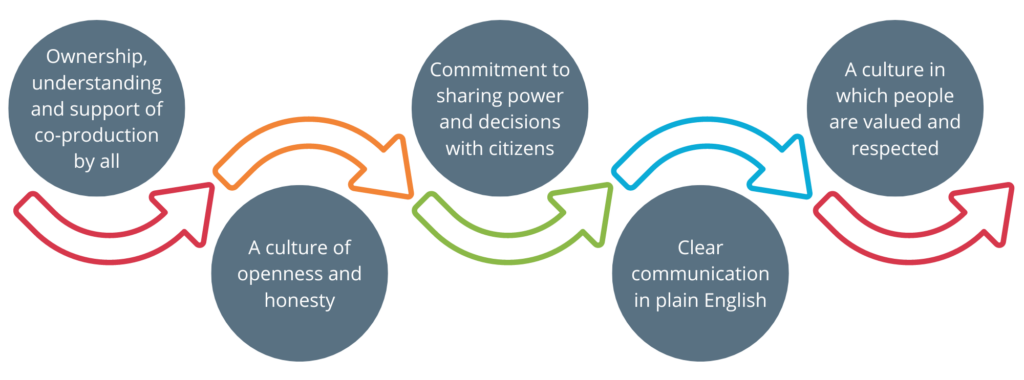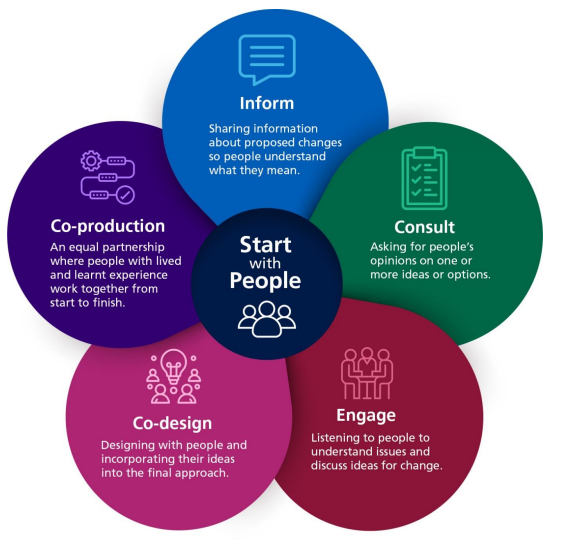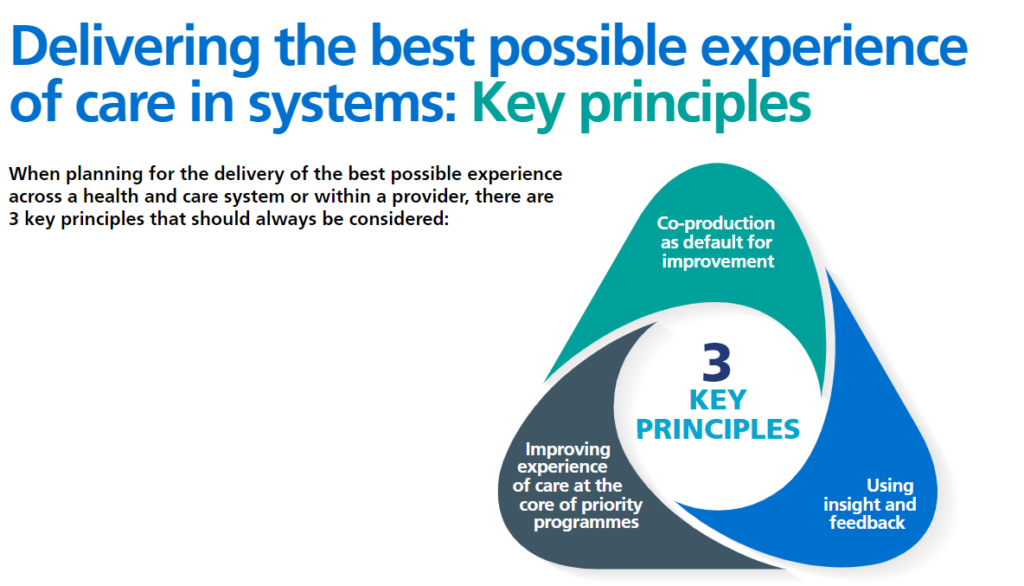Co-production
“Co-production is a way of working that involves people who use health and care services, carers and communities in equal partnership; and which engages groups of people at the earliest stages of service design, development and evaluation.
Co-production acknowledges that people with ‘lived experience’ of a particular condition are often best placed to advise on what support and services will make a positive difference to their lives. Done well, co-production helps to ground discussions in reality, and to maintain a person-centred perspective. Co-production is part of a range of approaches that includes citizen involvement, participation, engagement & consultation.”
Values and behaviours
For co-production to become part of the way we work, we will create a culture where the following values and behaviours are the norm:

Image from A Co-production Model. Produced by NHS England and Coalition for Personalised Care.
Image description:
The image displays the following the values and behaviours needed to ensure co-production becomes part of the way we work:
- Ownership, understanding and support of co-production by all
- A culture of openness and honesty
- Commitment to sharing power and decisions with citizens
- Clear communication in plain English
- A culture in which people are valued and respected.
Resource
Watch a short animation on The World of Co-Production to explore a map of common pitfalls and benefits of co-producing.
Working in partnership with people and communities
The statutory guidance on working in partnership with people and communities identifies the legal duties organisations that are required to make to ensure that people are appropriately ‘involved’ in planning, proposals and decisions regarding NHS services. A blended approach to working partnership with people and communities is required and a number of approaches are identified, including co-production. It is important to have clarity regarding the rational for the chosen approaches.
Image description:
This diagram is from Annex A: Implementation of the Statutory guidance for working in partnership with people and communities.
It shows some of the different ways of working with people and communities:
- Inform: Sharing information about proposed changes so people understand what they mean.
- Consult: Asking for people’s opinions on one or more ideas or options.
- Engage: Listening to people to understand issues and discuss ideas for change.
- Co-design: Designing with people and incorporating their ideas into the final approach.
- Co-production: An equal partnership where people with lived and learnt experience work together from start to finish.
Improving experience of care: A shared commitment for those working in health and care systems
The National Quality Board document Improving experience of care: A shared commitment for those working in health and care systems was also refreshed and published in October 2022. This identified 3 key principles that should always be considered when planning for the delivery of the best possible experience across a health and care system or provider.
Image description:
The diagram displays the key principles of delivering the best possible experience of care in systems.
It states that when planning for the delivery of the best possible experience across a health and care system or within a provider, there are 3 key principles that should always be considered:
- co-production as default for improvement
- using insight and feedback
- improving experience of care at the core of propriety programmes.
Co-production as the default for improvement is an essential part of improvement methodology.
Watch this short interview with Don Berwick, President Emeritus and Senior Fellow at the Institute for Healthcare Improvement (IHI) in conversation with We Coproduce on the topic of communities and healthcare systems.
Co-production in our learning from the pandemic response
The COVID-19 pandemic was a catalyst that sparked new partnerships, accelerated research, and increased the speed at which innovations were adopted across the health and social care system. The Accelerated Access Collaborative (AAC) and the Beneficial Changes Network (BCN) commissioned Frontier Economics, Kaleidoscope Health and Care, and RAND Europe, to conduct an independent review to help learn lessons from this period and recommend how potentially beneficial changes can become day to day practice. It was conducted between October and December 2020 and involved a range of lived experience voices and over 80 stakeholder organisations. The number one critical ingredient for change was co-production. This was endorsed by the Quality and Innovation Committee at NHS England in March 2021 and there is now work underway to co-produce how we bring this recommendation to light and shift the culture of the way we work to ensure it is co-production as default.
Resource
Co-production as default: a critical ingredient for change in implementing COVID-19 related beneficial changes and recovery.
Critical ingredients for change
- Co-production as default
- Prioritise reducing inequalities
- Leadership for innovation
- Innovation-friendly environment
What we say needs to be done to implement the co-production as default
Work with system partners to place co-production – including people with relevant lived experience – at the centre of how the health and care system learns and embeds change from the response to COVID-19.
In local services, in ICSs and nationally, we will transform our ways of working so that we are able to demonstrate that we:
- always start from what matters most to people who use and work in services
- work with people who have relevant lived experience (patients, service users, unpaid carers and people in paid lived experience roles) and with staff, in everything we do to directly connect with multiple and diverse voices
- build equal and reciprocal partnerships with people who have relevant lived experience, and staff, including with those from.
Further information can be found at our FutureNHS Co-production workspace – we welcome people with lived and learnt experience to join the platform. Log in is required but you don’t need to have an NHS email to access.
For further information on co-production or Always Events please email england.eoccoproduction@nhs.net


